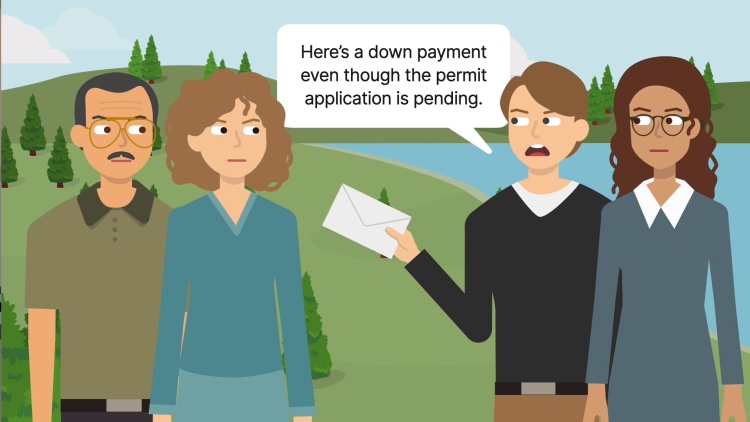Chomicky v. Buttolph
Vermont Supreme Court
513 A.2d 1174 (1986)
- Written by Megan Petersen, JD
Facts
Buttolph (defendant) owned lakeside property. Buttolph desired to sell a portion of the property, while retaining the remaining portion of the property that provided lake access. Chomicky (plaintiff) entered into negotiations to purchase Buttolph’s property. Chomicky and Buttolph reached agreement and signed a purchase and sale contract in August 1985. The contract, however, was made contingent on Buttolph’s ability to obtain a subdivision permit from the Leicester Planning Commission (Commission). On October 1, 1985, Chomicky proposed an alternate arrangement that would permit Buttolph to go through with the sale even if the Commission denied his application for the subdivision permit. Chomicky suggested Buttolph sell the entire property while retaining an easement specifically granting Buttolph lake access. Buttolph orally agreed to this arrangement. On October 12, 1985, the Commission met and denied Buttolph’s application for a subdivision permit. On October 13th, Buttolph telephoned Chomicky and informed him that “the deal was off.” Buttolph now wanted to sell the whole parcel or nothing. Chomicky brought suit in Vermont state court against Buttolph alleging breach of contract and seeking specific performance. The trial court awarded specific performance of the oral sale of property to Chomicky, and Buttolph appealed.
Rule of Law
Issue
Holding and Reasoning (Hill, J.)
What to do next…
Here's why 911,000 law students have relied on our case briefs:
- Written by law professors and practitioners, not other law students. 47,100 briefs, keyed to 997 casebooks. Top-notch customer support.
- The right amount of information, includes the facts, issues, rule of law, holding and reasoning, and any concurrences and dissents.
- Access in your classes, works on your mobile and tablet. Massive library of related video lessons and high quality multiple-choice questions.
- Easy to use, uniform format for every case brief. Written in plain English, not in legalese. Our briefs summarize and simplify; they don’t just repeat the court’s language.





